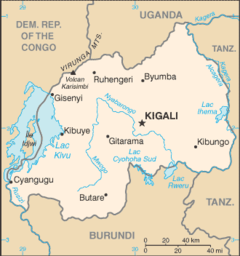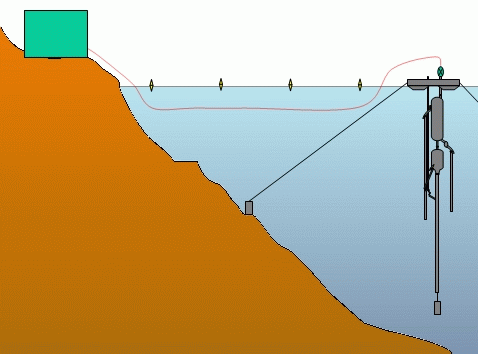Turning Danger Into Power
Posted by Big Gav in lake kivu, methane, rwanda
"Engineer Live" has an interesting article on avoiding a Lake Nyos style tragedy in the regions bordering Lake Kivu, between Rwanda and the Congo, and generating a large amount of power while doing so - by extracting methane from the lake water and using it for power generation. The waters of Lake Kivu have absorbed enormous amounts of gas over the years, estimated to be around 250 billion m3 of carbon dioxide and 55 billion m3 of methane, with the total amount rising 20% since the 1970's. The lake sits at an altitude of almost 1500 metres above sea level and covers an area of about 2400 km2, with a maximum depth of 600 metres. Only two other lakes are known to harbour similar quantities of gases – Lakes Monoun and Nyos in Cameroon. In both of these cases, however, carbon dioxide predominates - the quantities of methane are too small for exploitation to be worthwhile.
The waters of Lake Kivu have absorbed enormous amounts of gas over the years, estimated to be around 250 billion m3 of carbon dioxide and 55 billion m3 of methane, with the total amount rising 20% since the 1970's. The lake sits at an altitude of almost 1500 metres above sea level and covers an area of about 2400 km2, with a maximum depth of 600 metres. Only two other lakes are known to harbour similar quantities of gases – Lakes Monoun and Nyos in Cameroon. In both of these cases, however, carbon dioxide predominates - the quantities of methane are too small for exploitation to be worthwhile.
The carbon dioxide in the deep waters of the lake mainly derive from volcanic activity, while the methane is produced by bacteria decomposing dead organic matter in the anoxic bottom waters. According to Swiss researcher Martin Schmid from Eawag, the rise in methane concentrations observed over the past 20–30 years is likely attributable to two factors: a huge increase in nutrient inputs, associated with the growing population around the lake, and the introduction of a sardine species that has had a major impact on nutrient cycles.
The gas poses a threat to both the 2 million local inhabitants (in the event of a gas eruption from the lake) and the planet as a whole (methane being a potent greenhouse gas). Analysis of the lake's geological history indicates a periodic biological extinction around the lake around every 1,000 years. The trigger for lake overturns is unknown but scientists hypothesize that sufficient volcanic interaction with the lake's bottom water that has high gas concentrations would heat the water, force the methane out of it, spark a methane explosion, and trigger a nearly simultaneous release of carbon dioxide. The carbon dioxide would then suffocate large numbers of people in the lake basin as the gases roll off the lake surface. It is also possible that the lake could spawn lake tsunamis as gas explodes out of it.
The dissolved methane also provides an opportunity, as the gas can be extracted from the lake and used for power generation and other applications. The value of Lake Kivu’s gas reserves is estimated by experts at around CHF 16 billion (US$14.3 billion).
Extraction of gas has already been done on a small scale, with the extracted gas being used to run boilers at a brewery up until 2004.
The Rwandan government is in negotiations with a number of parties to produce methane from the lake on a larger scale. It recently awarded the South African engineering company Murray & Roberts a contract to construct a power station, with a pilot project to be initiated early this year. Efforts to establish a power station seem to have been underway for a few years now, with various delays being experienced. The BBC has also reported on a company called EcoEnergy looking to build a plant.
Extraction is said to be cost effective and simple because once the gas rich water is pumped up from the depths the dissolved gases bubble out as the pressure falls. The methane in the lake is estimated to be sufficient to meet Rwanda's needs for 200 years and 400 years. Using the gas may mean far less logging in the area since Rwanda currently gets 90 per cent of its energy from wood burning, with forests disappearing at a rate of 4% per year.
Like many other examples of renewable energy sources, this, by itself, is not a solution to the energy problem posed by peak oil - however, it is one more example of the dozens of local alternatives that can be exploited to meet our energy needs - and in an area cursed with trouble that, as Thomas Homer-Dixon pointed out, at least partially stems from competition over resources. This could be considered the aquatic equivalent of generating energy using biogas from landfills or farm waste.





